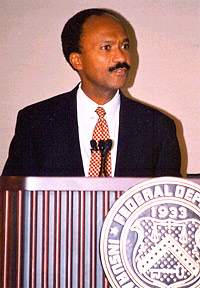
The Bear Stearns Companies, Inc. was an American investment bank, securities trading, and brokerage firm that failed in 2008 during the 2007–2008 financial crisis and the Great Recession. After its closure it was subsequently sold to JPMorgan Chase. The company's main business areas before its failure were capital markets, investment banking, wealth management, and global clearing services, and it was heavily involved in the subprime mortgage crisis.

Franklin Delano Raines, also known as Frank Raines, is an American business executive. He is the former chairman and chief executive officer of the Federal National Mortgage Association, commonly known as Fannie Mae, who served as White House budget director under President Bill Clinton. His role leading Fannie Mae has come under scrutiny. He has been called one of the "25 People to Blame for the Financial Crisis" according to Time magazine.
A collateralized debt obligation (CDO) is a type of structured asset-backed security (ABS). Originally developed as instruments for the corporate debt markets, after 2002 CDOs became vehicles for refinancing mortgage-backed securities (MBS). Like other private label securities backed by assets, a CDO can be thought of as a promise to pay investors in a prescribed sequence, based on the cash flow the CDO collects from the pool of bonds or other assets it owns. Distinctively, CDO credit risk is typically assessed based on a probability of default (PD) derived from ratings on those bonds or assets.
Bank of America Home Loans is the mortgage unit of Bank of America. It previously existed as an independent company called Countrywide Financial from 1969 to 2008. In 2008, Bank of America purchased the failing Countrywide Financial for $4.1 billion. In 2006, Countrywide financed 20% of all mortgages in the United States, at a value of about 3.5% of the United States GDP, a proportion greater than any other single mortgage lender.

The 2000s United States housing bubble or house price boom or 2000shousing cycle was a sharp run up and subsequent collapse of house asset prices affecting over half of the U.S. states. In many regions a real estate bubble, it was the impetus for the subprime mortgage crisis. Housing prices peaked in early 2006, started to decline in 2006 and 2007, and reached new lows in 2011. On December 30, 2008, the Case–Shiller home price index reported the largest price drop in its history. The credit crisis resulting from the bursting of the housing bubble is an important cause of the Great Recession in the United States.

Ameriquest was one of the largest United States sub-prime mortgage lenders until its dissolution in September 2007. Among the first mortgage companies employing computers to solicit prospective borrowers and hasten the loan application process, Ameriquest was accused of predatory lending practices by United States banking regulators. The company was notable for its promotion of the stated income loan, whereby potential borrowers were allowed to claim income without verification of employment. The proliferation of lending to customers with marginal creditworthiness proved to be not only a key factor leading to the 2007 subprime mortgage financial crisis, but also a catalyst to Ameriquest's own demise.

Roland E. Arnall was an American businessman and diplomat. As the owner of ACC Capital Holdings, he became a billionaire with Ameriquest Mortgage. Additionally he funded, financed and was the visionary and co-founder of the Simon Wiesenthal Center, and from 2006 until shortly before his death he was the United States Ambassador to the Netherlands.

Earnest Stanley O'Neal is an American business executive who was chairman and CEO of Merrill Lynch from 2003 through 2007, having served in numerous senior management positions at the company prior to this appointment. O'Neal was criticized for his performance during his tenure as chief executive at Merrill Lynch, where he oversaw the deterioration of the firm's stability and capital position, which resulted in his ouster in October 2007, and the firm's eventual fire sale to Bank of America one year later. Prior to his tenure as chairman and CEO, Merrill Lynch had thrived as a stand-alone company since 1914.

The American subprime mortgage crisis was a multinational financial crisis that occurred between 2007 and 2010 that contributed to the 2007–2008 global financial crisis. The crisis led to a severe economic recession, with millions losing their jobs and many businesses going bankrupt. The U.S. government intervened with a series of measures to stabilize the financial system, including the Troubled Asset Relief Program (TARP) and the American Recovery and Reinvestment Act (ARRA).

American Freedom Mortgage, Inc. (AFM) was a private S Corporation incorporated on February 2, 2001, according to the Georgia Secretary of State, and headquartered in Marietta, Georgia. AFM conducted business as a multi-state direct-to-consumer correspondent lender and mortgage broker specializing in the origination of subprime and Alt-A mortgage loans. AFM also operated a wholesale mortgage lending division that originated loans via approved mortgage brokers and which used the fictitious name AFMI Funding. As a correspondent lender, AFM sold the mortgage loans on the open market to larger investors.
A stated income loan is a mortgage where the lender does not verify the borrower's income by looking at their pay stubs, W-2 forms, income tax returns, or other records. Instead, borrowers are simply asked to state their income, and taken at their word. These loans are sometimes called liar loans or liar's loans. Stated income loans were originated by Ameriquest.
United States housing prices experienced a major market correction after the housing bubble that peaked in early 2006. Prices of real estate then adjusted downwards in late 2006, causing a loss of market liquidity and subprime defaults.

Angelo Robert Mozilo was an Italian American mortgage industry banker who was co-founder, chairman of the board, and chief executive officer of mortgage giant Countrywide Financial until July 1, 2008. Mozilo retired shortly after the sale to Bank of America for a total of $4.1 billion in stock. The company's status as a major lender of subprime mortgages made it a central player in a subsequent mortgage crisis which collapsed the industry, bursting a housing bubble which had accumulated throughout the 2000s, and contributing heavily to the Great Recession. Mozilo later paid over $67 million in fines to settle a series of federal charges related to his conduct at the company. While Mozilo is often mentioned in connection with the 2008 housing crisis, he remains highly regarded among many mortgage and housing industry leaders and insiders.
The subprime mortgage crisis impact timeline lists dates relevant to the creation of a United States housing bubble, the 2005 housing bubble burst and the subprime mortgage crisis which developed during 2007 and 2008. It includes United States enactment of government laws and regulations, as well as public and private actions which affected the housing industry and related banking and investment activity. It also notes details of important incidents in the United States, such as bankruptcies and takeovers, and information and statistics about relevant trends. For more information on reverberations of this crisis throughout the global financial system see 2007–2008 financial crisis.
Credit rating agencies and the subprime crisis is the impact of credit rating agencies (CRAs) in the American subprime mortgage crisis of 2007–2008 that led to the financial crisis of 2007–2008.
Government policies and the subprime mortgage crisis covers the United States government policies and its impact on the subprime mortgage crisis of 2007–2009. The U.S. subprime mortgage crisis was a set of events and conditions that led to the 2007–2008 financial crisis and subsequent recession. It was characterized by a rise in subprime mortgage delinquencies and foreclosures, and the resulting decline of securities backed by said mortgages. Several major financial institutions collapsed in September 2008, with significant disruption in the flow of credit to businesses and consumers and the onset of a severe global recession.

Kenneth D. Lewis is the former CEO, president, and chairman of Bank of America, currently the second largest bank in the United States and twelfth largest by total assets in the world. While CEO of Bank of America, Lewis was noted for purchasing the failing companies Countrywide Financial and Merrill Lynch, resulting in large losses for the bank and necessitating financial assistance from the federal government. On September 30, 2009, Bank of America confirmed that Lewis would be retiring by the end of the year. Lewis was replaced by Brian Moynihan as president and CEO and Walter Massey as chairman of the board.
First Franklin Financial Corp., not to be confused with 1st Franklin Financial Corporation, was a San Jose, California-based home mortgage lender that specialized in subprime loans. It had been owned by two of the biggest casualties of the subprime mortgage crisis, National City Corp. in Cleveland and Merrill Lynch.

Many factors directly and indirectly serve as the causes of the Great Recession that started in 2008 with the US subprime mortgage crisis. The major causes of the initial subprime mortgage crisis and the following recession include lax lending standards contributing to the real-estate bubbles that have since burst; U.S. government housing policies; and limited regulation of non-depository financial institutions. Once the recession began, various responses were attempted with different degrees of success. These included fiscal policies of governments; monetary policies of central banks; measures designed to help indebted consumers refinance their mortgage debt; and inconsistent approaches used by nations to bail out troubled banking industries and private bondholders, assuming private debt burdens or socializing losses.

The 2007–2008 financial crisis, or the global financial crisis (GFC), was the most severe worldwide economic crisis since the 1929 Wall Street crash that began the Great Depression. Causes of the crisis included predatory lending in the form of subprime mortgages to low-income homebuyers and a resulting housing bubble, excessive risk-taking by global financial institutions, and lack of regulatory oversight, which culminated in a "perfect storm" that triggered the Great Recession, which lasted from late 2007 to mid-2009. The financial crisis began in early 2007, as mortgage-backed securities (MBS) tied to U.S. real estate, as well as a vast web of derivatives linked to those MBS, collapsed in value. Financial institutions worldwide suffered severe damage, reaching a climax with the bankruptcy of Lehman Brothers on September 15, 2008, and a subsequent international banking crisis.












